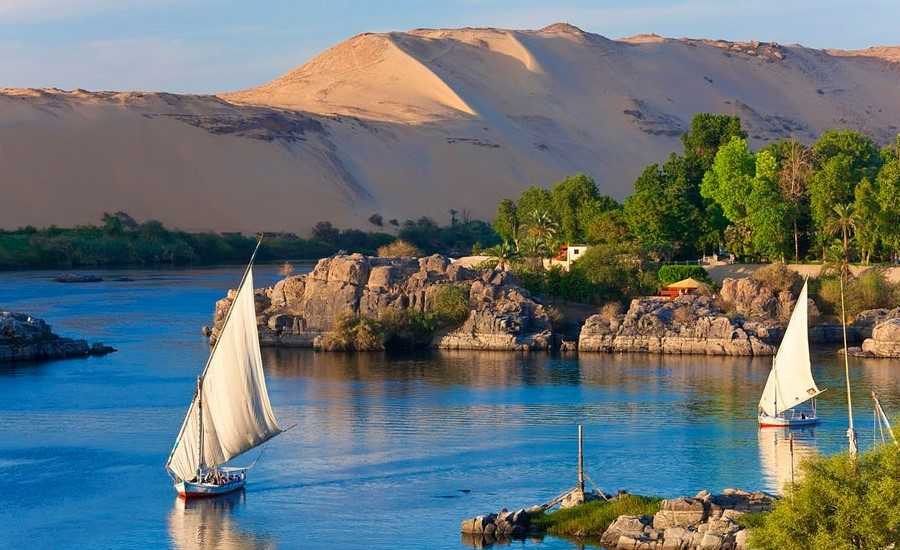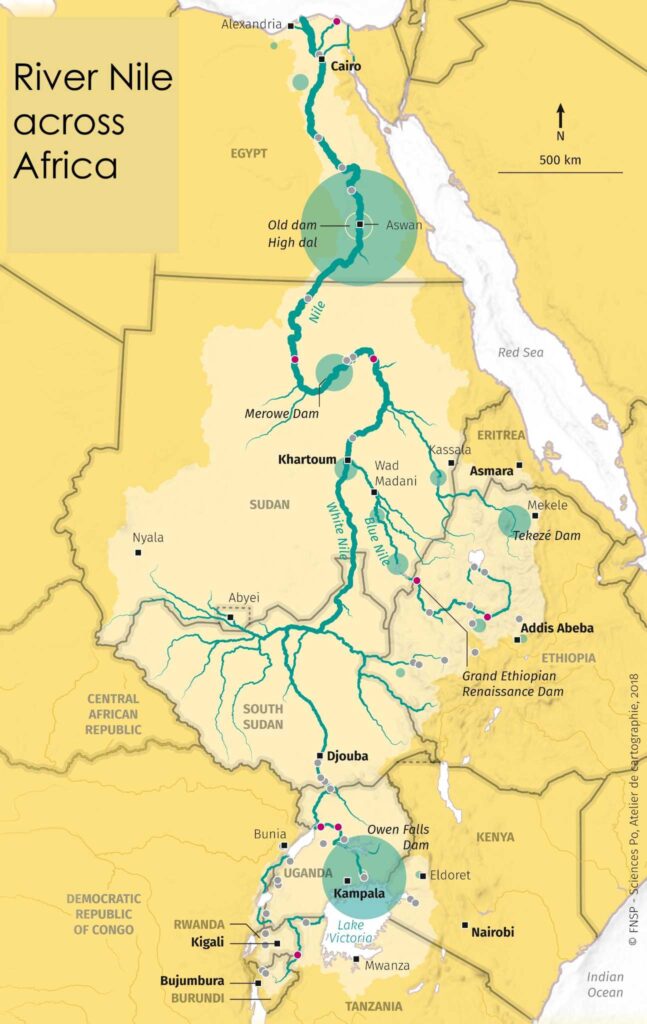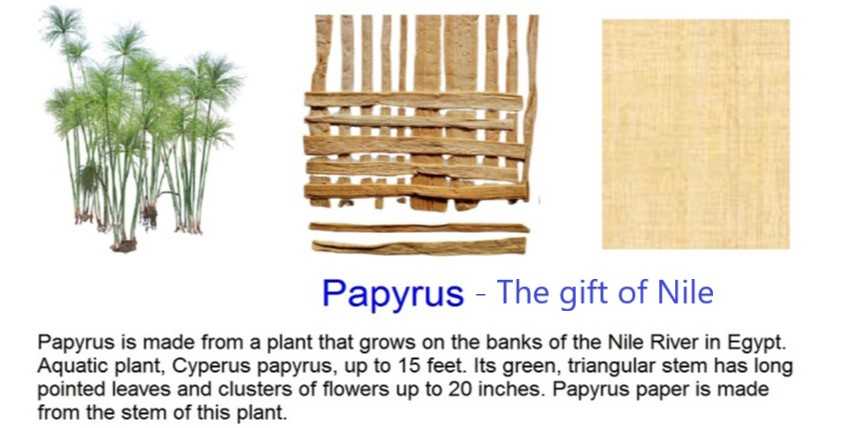Have you heard someone call Egypt, the gift of the Nile? A civilization built on its water supply, Egypt is one of the ancient cities of the world. The Nile flows upwards because of mountains located in Central Africa and lower altitude regions in the north. The Nile is also the main source of water for Egypt.
In the process of human evolution, people started living near water sources, having learned the importance of water to grow plants and crops. This aided in the advancement of the Egyptian empire. It was also the reason why Egyptians thought the gift of the Nile was given to them by their gods.
The word Nile means life. It has been a blessing for the inhabitants of Egypt not only for agriculture but also for the flora and fauna around the river, accessibility for transportation and trade, among other benefits.

The gift of Nile
During the Neolithic or Stone Age, groups of people living together learned to cultivate crops and plants. Agriculture evolved, and people moved on from the practice of hunting. There was a group of people from North East Africa who settled near the river Nile thus bringing into existence the Egyptian Civilization around 5000 years ago.
The culture and Civilization developed over time. The gift of the Nile helped people grow crops. The river Nile flooded once every year, which was considered a blessing for the settlers as this flooding aided in agriculture. The floods would lead to the deposition of silt in the area along the river Nile which was beneficial for the crops.
The flooding of the river every year occurs around mid-August and continues during the second half of the month. This period is also observed as a holiday. This flooding is the gift of the Nile in the monsoon season. Starting in May, this continues till August.
This flooding of the Nile has influenced the seasonal trends in the Egyptian calendar. The sowing, harvesting and inundation of the land are considered the agricultural season linked to the gift of the Nile. Initially, people faced huge losses due to the flooding as their houses and crops were destroyed. But later, they learnt to adapt to the situation by working on alternatives.

Myths on the gift of the Nile
A legend is believed to be associated with this phenomenon of flooding. There is said to be a story of two lovers Isis and her husband, Osiris. The flooding was considered a result of Isis’ grief and moaning for her dead husband Osiris in the form of a huge stream of tears.
There are other folklores and beliefs developed by the people about the gift of the Nile. Some believed that the brightest star in the galaxy named Sirius appeared when the flooding began. According to some historians, this marked the start of the new year in Egypt. Some also believed that it coincided with summer solstice phenomenon.
Others believed that gods controlled the river and brought prosperity to the land through its fertility. One popular story stated that humans were created from the mud formed through the silt from the floods.
Also Read:
- Top 20 Places to Visit In North East India
- Best 20 Places to Visit in Kolkata
- 20 Best Places to Visit in Coorg – Madikeri Karnataka
Adapting to floods
The Egyptians, over time, learned to build a basin to store the excess water from flooding around 7000 years ago. This water was stored for a period of 45 days until the soil was saturated to deposit silt. The water from the gift of the Nile was released for irrigation of crops, and some of it merged back with the Nile.
In the last century, a dam was constructed to help in proper water storage and distribution. A drawback of this was certain heritage monuments were affected, which were later broken and moved to another site.
Other gifts of the Nile
Agriculture: The Egyptians could grow different plants and trees that provided fruits and vegetables because of the fertile soil. Some popular fruit plantations were figs, apples, grapes, melons and pomegranates.
The vegetables grown here included radish, onions, peas, spinach, carrots, cucumbers, pumpkins, lettuce, and turnips. Spices like garlic and barley crops were among the other dominant produce of the land. Besides these, flax was cultivated to produce clothing raw materials.
Pastureland: The gift of the Nile that facilitated the produce of meat, milk, hides and dung for cooking was the availability of pasture lands. Herdsmen brought their sheep, goats, oxen and cows to graze in the fertile marshes of the Nile. Among these animal by-products, milk had the highest value.
Fish and water birds: The gift of the Nile has a variety of fish flowing through its stream. There are birds like ducks and wild geese also living near the banks of the river Nile. These birds lay eggs which are used as food. Larger animals like hippopotamus and crocodiles are also found in and along the river.
Water: A basic human need, unlike seas, the Nile is a river with water that can be consumed to quench thirst and do general household chores like bathing, washing and cleaning. The water is not salty, unlike the water in the sea.
Papyrus: Papyrus is a plant that grew on Nile’s River beds, and this was one of the gifts of the Nile that was unique to this region. This plant was widely used to produce a paper as a writing aid. Besides this, even boats were built of papyrus as wood was not easily available. Footwear like sandals and baskets were also made of papyrus.

Trade and Transportation: Due to its long course through Africa, the Nile was used for transportation. The water currents moved in one direction while the wind in another. This aided the movement of boats using sail or through the natural water flow in either direction.
Building Material: The silt deposited by the Nile provided black soil, clay, limestone, granite and sandstone. These materials were useful for the construction of houses and other structures.
A land influenced by many religions and cultures, Egypt has been invaded by different political powers because of the gift of the Nile that has added more value to this land. A land of rich resources and a melting pot of cultures, Egypt has managed to stay relevant because of its adaptability and historical significance.
Conclusion
No wonder Herodotus, the Greek historian, once said, “Egypt is the gift of river Nile.” Thanks to the abundance of water supply, we have been introduced to the world’s oldest Civilization and a plethora of traditions, art, culture and associations through trade.
Frequently Asked Questions
-
Which African country is the gift of the Nile?
Egypt is the gift of the Nile.
-
Why was Egypt called the gift of the Nile?
Egyptian Civilization could grow and sustain because of the presence of the Nile River. Hence Egypt is called the gift of the Nile.
-
What gifts did the Nile offer Egypt?
Through its presence, the river Nile provided water, rich black soil, papyrus, supplies used as building material and means of transportation.
-
Why is the Nile important for Egypt?
The Nile River is the main source of water for Egypt, which has an extensive desert. This helps maintain the ecological cycle of rain and plantation as well.
-
How is Egypt well connected with different countries for trade and transportation?
Egypt is well connected for trade and transportation through the river Nile by boats and ships.